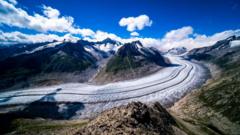The world’s glaciers, critical to freshwater resources for millions, are melting at an unprecedented rate due to climate change, according to a pivotal new study. The research, published in the journal Nature, compiled over 230 regional estimates from 35 global research teams, revealing that since the year 2000, glaciers have lost over 6,500 billion tonnes of ice—amounting to a 5% decrease. Alarmingly, the rate of melting has accelerated, with losses in the past decade exceeding those recorded from 2000 to 2011 by more than a third.
Mountain glaciers, often regarded as frozen rivers of ice, serve as vital freshwater reserves. If they were to completely melt, it could elevate global sea levels by approximately 32 centimeters (approximately 13 inches). Michael Zemp, the director of the World Glacier Monitoring Service and lead author of the study, emphasized that the annual loss of 270 billion tonnes of ice corresponds to the water consumption of the global population over three decades, assuming an average of 3 liters per person per day.
The study also highlights that the most extreme changes in glacier mass are occurring in regions like Central Europe, which has already seen a staggering 39% loss in glacier ice over the past two decades. While the findings reinforce previously known trends, the strength of this research lies in its comprehensive nature, bringing together diverse methods of assessing glacier changes, from field measurements to satellite data.
Despite ongoing losses, glaciers take time to respond to shifts in climate, continuing to melt for years or even decades depending on their size. The study warns that the extent of ice loss by the end of this century is heavily contingent on humanity’s ability to limit carbon emissions. Failure to meet climate targets could lead to the loss of nearly half of the world’s glacier ice.
The implications extend far beyond melting ice; hundreds of millions of people rely on glacier-fed meltwater to stave off drought, and the loss of these natural reservoirs could exacerbate water shortages. Additionally, even minor increases in global sea levels can heighten the risk of coastal flooding—an alarming reality as sea levels have already risen over 20 centimeters (8 inches) since 1900, with recent years witnessing accelerated changes.
As the climate crisis continues to unfold, the findings of this study underscore the urgent need for global cooperation to combat climate change and protect essential natural resources.





















